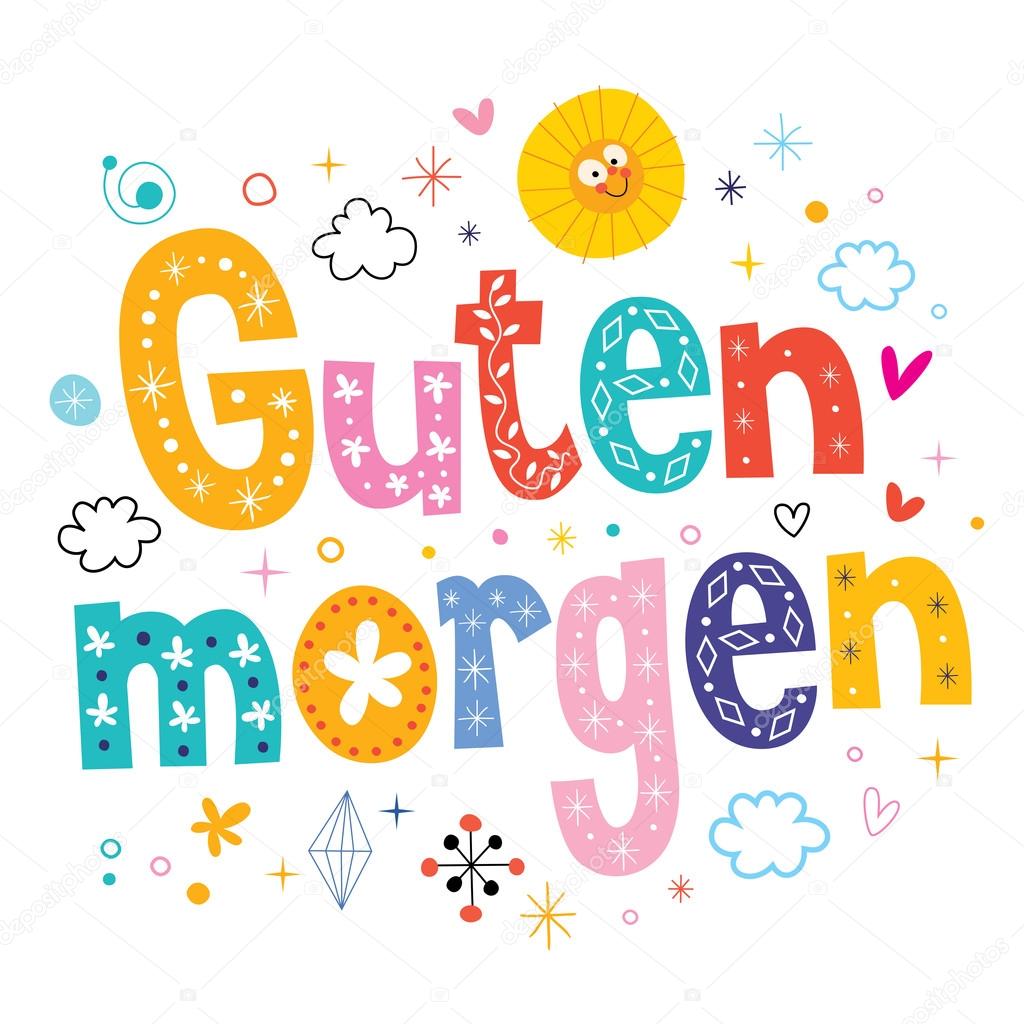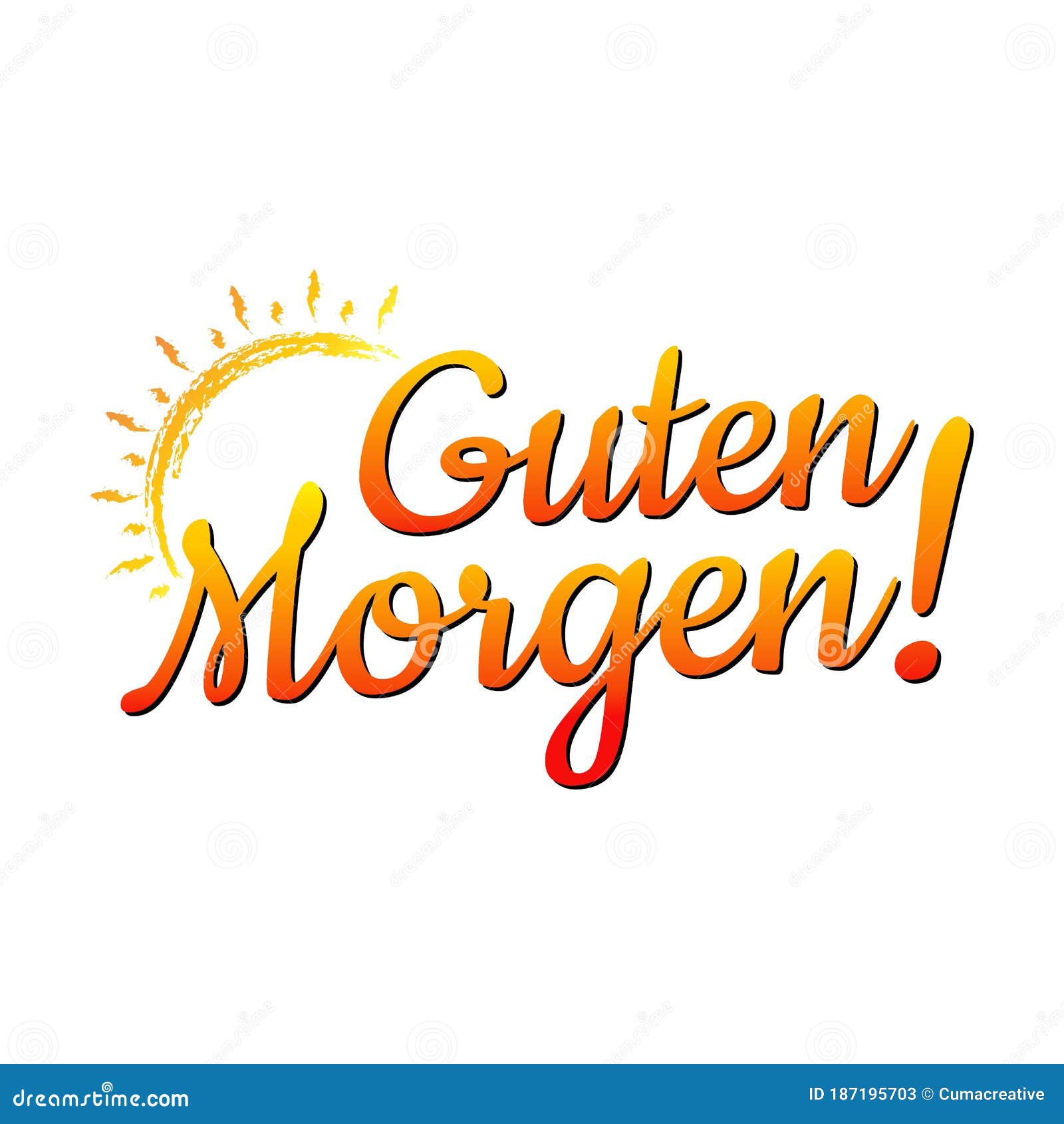Good Morning In German - Your Simple Language Helper
There's something quite lovely about speaking a few words in a new tongue, isn't there? It really is, you know, a way to connect with folks from different places. Just a simple greeting, like "good morning," can open up a little door, allowing you to share a moment with someone, even if you don't speak much of their language. It's a small gesture, yet it carries a lot of warmth, showing you care enough to try. So, when you think about visiting a new country or meeting people who speak a different language, getting a handle on those first few welcoming phrases feels pretty important, more or less.
Learning how to say "good morning" in German, for instance, can be a really nice starting point. It’s a phrase that everyone understands, a friendly wave that says, "Hello, I acknowledge you." You don't need to be a language expert to make someone's day a little brighter with a familiar sound from their own language. It's, like, a universal sign of good manners and respect, and it shows you're open to the culture around you. In some respects, it's just a kind thing to do, and people often appreciate the effort, you know?
And the good news is, getting these simple phrases right has become so much easier than it used to be. There are helpful things out there that can change words from one tongue to another in a flash, allowing you to pick up phrases like "good morning" in German without any fuss at all. This kind of assistance makes it pretty simple to step out of your usual way of speaking and try something new, giving you the confidence to say hello in a way that feels natural and welcoming to others. It’s a tool that takes away the worry, so you can focus on the connection.
Table of Contents
- Why Bother with "Good Morning" in German?
- Getting Started with "Good Morning" in German
- Are There Other Ways to Say "Good Morning" in German?
- Finding Help for "Good Morning" in German
- What Makes a Good Tool for "Good Morning" in German?
- How Does a Free Tool Help with "Good Morning" in German?
- The Little Pleasures of "Good Morning" in German
- Your Next Steps with "Good Morning" in German
Why Bother with "Good Morning" in German?
You might wonder why taking the time to learn just a few words, like "good morning" in German, is worth it. Well, it's actually quite simple, really. When you speak to someone in their own language, even just a little bit, it shows a level of thoughtfulness. It tells them you see and respect their culture, and that you're interested in connecting on a deeper level than just pointing or using hand gestures. It can make a person smile, which, you know, is a pretty nice outcome in itself.
Think about walking into a small shop in a German-speaking place. If you can greet the shopkeeper with a friendly "good morning" in German, their face will likely light up. It’s a small exchange, but it can change the whole feel of that interaction. It shows you're not just a passerby; you're someone who cares to make a good impression. And, honestly, it often makes people more willing to help you out, or to chat a little, which is pretty cool.
Beyond travel, maybe you have friends or colleagues who speak German. Using "good morning" in German with them can build a stronger bond. It’s a sign of friendship, a way to bridge any language gaps, and a pleasant surprise for them. It’s like a little secret handshake that says, "I value our connection." So, basically, it's about making things a bit more personal and friendly, and that's something we all appreciate, isn't it?
Getting Started with "Good Morning" in German
So, you're ready to learn "good morning" in German. That's a great start! The most common way to say it is "Guten Morgen." It's pronounced something like "GOO-ten MOR-gen." The "Guten" part sounds a bit like "good" with an "en" at the end, and "Morgen" is very close to "morning." It's not too tricky to get your tongue around, honestly. Just try saying it a few times, and you'll probably get the hang of it pretty quickly, you know?
To make sure you're saying it right, you could try listening to how native speakers say it. There are lots of ways to do this, like finding videos online or using a helpful tool that speaks the words out loud for you. Hearing the sound helps your brain get used to the rhythm and the way the words flow together. It's like learning a song; you listen to it over and over until you can sing it yourself, basically.
And remember, practice makes things easier. Don't worry about being perfect right away. The goal is to be understood and to make a friendly gesture. Even if your pronunciation isn't spot-on, the effort you make will be noticed and appreciated. So, just give it a go, say "Guten Morgen" with a smile, and see how people react. It's usually a very positive experience, as a matter of fact.
Are There Other Ways to Say "Good Morning" in German?
While "Guten Morgen" is the standard for "good morning" in German, you might hear other greetings depending on the time of day or the situation. For example, later in the day, people switch to "Guten Tag," which means "good day." This one is good to use from, say, late morning until early evening. It's a very common greeting and works in most situations, so it's a handy phrase to know as well, you know?
Then there's "Guten Abend" for "good evening," which is used when the sun starts to go down. And if it's really late, or you're saying goodbye for the night, you might hear "Gute Nacht" for "good night." These are all pretty straightforward once you get the pattern. It's just a matter of swapping out the time of day word, basically. So, while "Guten Morgen" is for the morning, these others help you greet people throughout the rest of the waking hours.
In some parts of Germany, especially in the south, and also in Austria, you might hear "Grüß Gott." This is a more traditional greeting, meaning something like "greet God" or "God bless you." It's used at any time of day. So, if you're in those areas, don't be surprised to hear it. It's just another friendly way to say hello, a little bit different from the standard "Guten" greetings, but very common there, you know?
Finding Help for "Good Morning" in German
Learning new words, especially in a language you're not used to, can feel a little bit like trying to find your way in a new city without a map. But these days, we have some truly amazing helpers that make it incredibly simple. When you want to figure out how to say "good morning" in German, or any other phrase, there are tools that can give you the answer in a flash. They are, you know, like having a language guide right in your pocket, ready whenever you need it.
These helpful online systems are designed to make language accessible to everyone. They can take words or even whole sentences you type in English and turn them into German, or any of over a hundred other languages, almost instantly. It's a pretty powerful thing, really, to have that kind of ability at your fingertips. You don't have to wait, or look up words in a big book; the answer is just there, right away, which is super convenient, you know?
And it's not just about single words. These tools can handle phrases, so you can type in "good morning" and get "Guten Morgen" back. They can even deal with entire web pages, which is kind of mind-blowing when you think about it. This means you can get the gist of what's being said on a German website, for instance, even if you don't speak a word of the language. It really breaks down barriers, making the world feel a little bit smaller and more connected, basically.
What Makes a Good Tool for "Good Morning" in German?
When you're picking a tool to help you with phrases like "good morning" in German, there are a few things that make one stand out. First off, it should be easy to use. You shouldn't have to spend ages figuring out how it works. You type in what you want to say, and it gives you the answer clearly and quickly. That's, like, the most important thing, you know?
Another really good quality is how fast it works. You want something that gives you the translation right away, not something that makes you wait. When you're trying to say "good morning" to someone, you need the phrase in the moment, not five minutes later. So, speed is a big plus. It's all about making things smooth and not interrupting your flow, basically.
And a truly great tool will also give you the option to hear the words spoken out loud. This is super helpful for pronunciation. Reading a word is one thing, but hearing how a native speaker says "Guten Morgen" is completely different. It helps you get the sounds right, which is pretty important for making sure people understand you. So, if it can speak the words, that's a definite win, as a matter of fact.
How Does a Free Tool Help with "Good Morning" in German?
The best part about some of these language helpers is that they don't cost anything to use. Yes, you read that right – they are offered free of charge. This means anyone, anywhere, can access them and get help with their language needs, whether it's for "good morning" in German or something more complex. It's pretty amazing, really, to have such a powerful resource available to everyone without a price tag, you know?
Because they are free, there's no reason not to give them a try. You can experiment with different phrases, practice your pronunciation, and just generally get a feel for how a new language works, all without spending a penny. This takes away any pressure and lets you learn at your own pace, which is a big deal for many people. It's like having a friendly tutor who's always available, basically.
These free tools also help bridge gaps between people. If you're traveling and meet someone who doesn't speak your language, you can use one of these helpers to communicate simple ideas, like a friendly "good morning" in German. It turns what could be a tricky situation into an easy and pleasant one. It's about making connections simpler and more direct, and that's a pretty wonderful thing, honestly.
The Little Pleasures of "Good Morning" in German
There's a real joy that comes from saying "good morning" in German and getting a warm response back. It’s a simple pleasure, but it’s a genuine one. It feels good to be understood, and it feels even better to make someone else feel seen and respected. These small acts of communication can brighten your day and the day of the person you're speaking with, you know? It's like a little ripple effect of kindness.
Imagine you're having breakfast in a small German cafe. When the server comes to your table, you look up, smile, and say "Guten Morgen." Their eyes light up, and they might even offer you a little extra friendly service. It’s these tiny moments that make travel so special, creating memories that stick with you long after you've returned home. It's, like, a way to truly experience a place, not just observe it, basically.
And it's not just for travelers. If you have German-speaking neighbors or colleagues, using "good morning" in German can make your daily interactions a little bit more pleasant. It shows you're thinking of them, that you're interested in their culture, and that you're open to learning. These small efforts can really build stronger relationships over time. So, it's pretty clear that a little bit of effort goes a long way, as a matter of fact.
Your Next Steps with "Good Morning" in German
So, what's next? Well, now that you know how simple it is to learn "good morning" in German, why not give it a try? Find one of those helpful online tools that changes words from one tongue to another. Type in "good morning" and listen to how it sounds. Say it out loud a few times until you feel comfortable with it. You'll be surprised how quickly you pick it up, honestly.
Then, look for chances to use it. Maybe you're watching a German movie or show, or you hear someone speaking German nearby. Even if you just say it to yourself in the mirror, it helps to build your confidence. The more you practice, the more natural it will feel. It's like learning to ride a bike; the first few tries might be wobbly, but soon you'll be zipping along, you know?
And don't stop at "good morning" in German! Once you've got that down, think about learning other simple greetings or phrases. "Please," "thank you," "excuse me" – these are all great next steps. Each new word or phrase you learn is another little key that unlocks more connections and experiences. It's a really rewarding journey, and it all starts with that first friendly "Guten Morgen."
This article has explored the warmth and connection that comes from saying "good morning" in German, highlighting how simple it is to learn and use this phrase. We've looked at the main way to say it, "Guten Morgen," and touched on other common greetings like "Guten Tag" and "Grüß Gott." We also discussed how helpful online tools can be, allowing anyone to instantly change words and phrases between languages, making it easy to pick up phrases like "good morning" in German for free. The piece covered why making this small effort is worthwhile, the qualities of a good language helper, and how these free resources can assist you. Finally, we considered the simple joys of using a new language and offered ideas for continuing your language adventure beyond just "good morning" in German.

Guten morgen bom dia em alemão Vetor de ©Aliasching 73153945

Good Morning Translate in German Language - Guten Morgen Stock Vector

Good Morning German Wishes for a Bright Joyful Day - Wish Morning